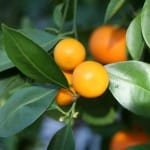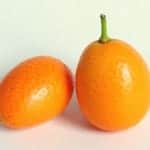Source(s): Gerard Krewer
With proper attention given to selection of the more cold hardy types of citrus, along with recommended care, this group of fruits may be successfully grown around homes in the coastal and extreme southern areas of the state and to a lesser degree in more northern locations.
Citrus plants are very versatile around the home and may be used as individual specimens, hedges or container plants. Their natural beauty and ripe fruits make them very attractive additions to the South Georgia home scene. Areas where citrus are best adapted within the state are generally south of a Columbus to Macon to Augusta line. The most significant limiting factor to citrus culture in these areas is the damage from severe winter temperature.
There are a number of hardy acid-type fruits available for homeowner use. These plants make attractive ornamental specimens as well as providing delightful fruits. All are self-fruitful, not requiring cross-pollination.
KUMQUATS
Kumquats are the most cold hardy of the commonly grown acid citrus fruits(15 to 17 degrees F). They possess a delayed resumation of growth in the spring, which helps avoid late freeze damage. The kumquat is one of the most widely used citrus plants around the home and develops into an attractive shrub-like tree which bears small, orange-like fruits about one inch in diameter. Fruits may be eaten fresh, peel and all, or used in making jellies, marmalade, candies, etc. Several varieties are available but only three are commonly propagated: Nagami, Marumi and Meiwa. Nagami fruit are oblong to pear-shaped and have acid pulp; the others are sweeter and rounder. Meiwa, which produces nearly round, sweet fruit, has become one of the most popular varieties for home planting.
CALAMONDINS
This small, round fruit looks somewhat like a tangerine and has a very acid pulp. It makes an attractive plant for use around the home as well as an indoor or container plant. Fruits are beautifully yellow to orange colored and are readily used as a substitute for limes and lemons. It has good cold hardiness(low 20s).
LEMONS
Meyer, one of the most cold hardy lemon selections, is recommended. The fruit ripening period usually lasts for several months beginning in late summer. Good crops of large, practically seedless, juicy lemons are produced. Plants developed from cuttings are often used around the home. Inherent cold hardiness approximates that of the sweet orange(mid 20s).
LIME HYBRIDS
The Eustis limequat is a very cold-hardy lime-kumquat hybrid which makes a very attractive small plant. It is popular as a container plant. Limequats produce fruit resembling the lime in appearance and quality and may serve as an excellent lime substitute. Cold hardiness is about equivalent to the tangerine(low 20s). Lakeland and Tavares are two less popular varieties occasionally found in retail outlets.
Resource(s): Citrus Fruits for Southern and Coastal Georgia
Center Publication Number: 170
- Growing Citrus Plants in Georgia – Sweet Types - September 24, 2013
- Growing Citrus Plants in Georgia – Acid Types - September 24, 2013
- Fertilization of Citrus Plants in Georgia - September 24, 2013

